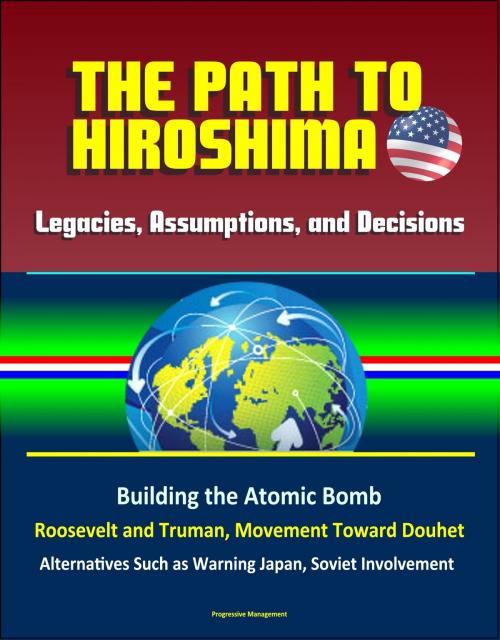Legacies, Assumptions, and Decisions: The Path to Hiroshima - Building the Atomic Bomb, Roosevelt and Truman, Movement Toward Douhet, Alternatives Such as Warning Japan, Soviet Involvement
Nonfiction, History, Military, Nuclear Warfare, World War II| Author: | Progressive Management | ISBN: | 9781370367245 |
| Publisher: | Progressive Management | Publication: | September 28, 2016 |
| Imprint: | Smashwords Edition | Language: | English |
| Author: | Progressive Management |
| ISBN: | 9781370367245 |
| Publisher: | Progressive Management |
| Publication: | September 28, 2016 |
| Imprint: | Smashwords Edition |
| Language: | English |
This important report has been professionally converted for accurate flowing-text e-book format reproduction. In 1995, the Smithsonian Institute's proposed exhibit of the Enola Gay on the occasion of the fiftieth anniversary of the use of the atom bomb on Hiroshima created a furor. Veterans' groups and members of Congress decried the anti-American tone of the exhibit's accompanying commentary and its suggestions that the bomb was not needed to avoid a costly invasion of Japan. Revisionist historians opposed the "cleansing" of history, called for a separation from emotionalism, and argued for the necessity of confronting the fundamental questions about Hiroshima. In the end, the Smithsonian removed the commentary. At root, these "history wars" reflected a lack of national closure on questions about the use of the bomb. Revisionists contend that the use of the bomb can best be understood as an opening salvo in the post-war competition with the Soviet Union. Traditionalists continue to insist that the bomb was used to speed the end of the war and to avoid the certain heavy loss of U.S lives which would have resulted from the planned invasion of the Japanese main islands. This paper attempts to step away from the emotionalism and examine the legacies, assumptions and decisions which led to the dropping of the atom bomb on Hiroshima August 6, 1945. It proceeds from the notion that such weighty national security decisions are rarely matters of "either/or" but are more often the result of a complex interaction of personalities, bureaucracies, perceptions and preferences.
An analysis of the decision to use of the atom-bomb must begin well before the few short months between Truman's sudden assumption of presidential authority and August 6, 1945. The process actually began in the U.S. in the growing concern shared by a group of emigre scientists that German advances in nuclear fission would allow the Nazis to realize the near-term development of an atomic weapon. German advances in nuclear science from 1938 on convinced one such scientist, Hungarian emigre Leo Szilard that an accelerated effort had to be made to develop a capability to counter the Nazi potential and, if necessary, to respond to the possible use of an atomic weapon. In their more expansive moments, the scientists also thought that such new and powerful weapons ultimately would contribute to development of an international regime for nuclear control which could be the beginning of a world government and end to war. However, the Nazi threat was more immediate and in 1939, working through Albert Einstein and Roosevelt confidant Alfred Sachs, Szilard obtained FDR's approval for an exploratory program on nuclear fission. FDR established the Advisory Committee on Uranium and funded it with an start-up grant of $6000. Initial work was slow, impeded by a military skepticism regarding the scientists' claims for the potential of fission and by the increasing diversions of a growing war in Europe.
This important report has been professionally converted for accurate flowing-text e-book format reproduction. In 1995, the Smithsonian Institute's proposed exhibit of the Enola Gay on the occasion of the fiftieth anniversary of the use of the atom bomb on Hiroshima created a furor. Veterans' groups and members of Congress decried the anti-American tone of the exhibit's accompanying commentary and its suggestions that the bomb was not needed to avoid a costly invasion of Japan. Revisionist historians opposed the "cleansing" of history, called for a separation from emotionalism, and argued for the necessity of confronting the fundamental questions about Hiroshima. In the end, the Smithsonian removed the commentary. At root, these "history wars" reflected a lack of national closure on questions about the use of the bomb. Revisionists contend that the use of the bomb can best be understood as an opening salvo in the post-war competition with the Soviet Union. Traditionalists continue to insist that the bomb was used to speed the end of the war and to avoid the certain heavy loss of U.S lives which would have resulted from the planned invasion of the Japanese main islands. This paper attempts to step away from the emotionalism and examine the legacies, assumptions and decisions which led to the dropping of the atom bomb on Hiroshima August 6, 1945. It proceeds from the notion that such weighty national security decisions are rarely matters of "either/or" but are more often the result of a complex interaction of personalities, bureaucracies, perceptions and preferences.
An analysis of the decision to use of the atom-bomb must begin well before the few short months between Truman's sudden assumption of presidential authority and August 6, 1945. The process actually began in the U.S. in the growing concern shared by a group of emigre scientists that German advances in nuclear fission would allow the Nazis to realize the near-term development of an atomic weapon. German advances in nuclear science from 1938 on convinced one such scientist, Hungarian emigre Leo Szilard that an accelerated effort had to be made to develop a capability to counter the Nazi potential and, if necessary, to respond to the possible use of an atomic weapon. In their more expansive moments, the scientists also thought that such new and powerful weapons ultimately would contribute to development of an international regime for nuclear control which could be the beginning of a world government and end to war. However, the Nazi threat was more immediate and in 1939, working through Albert Einstein and Roosevelt confidant Alfred Sachs, Szilard obtained FDR's approval for an exploratory program on nuclear fission. FDR established the Advisory Committee on Uranium and funded it with an start-up grant of $6000. Initial work was slow, impeded by a military skepticism regarding the scientists' claims for the potential of fission and by the increasing diversions of a growing war in Europe.















